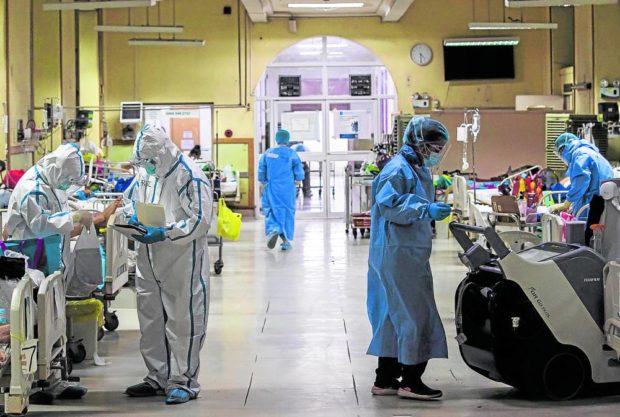Malacañang memo adopts PH health facility dev’t plan, urges LGUs to support program

FILE PHOTO: Healthcare workers remain busy at a dedicated Philippine General Hospital (PGH) facility. —RICHARD A. REYES
MANILA, Philippines — Malacañang has released a memorandum adopting the Philippine Health Facility Development Plan (PHFDP) 2020-2040, where local government units (LGUs) are urged to support the national government’s initiatives by setting up health facilities in their respective jurisdiction.
In a statement on Thursday, the Presidential Communications Office (PCO) confirmed that Memorandum Circular (MC) No. 26 was signed by Executive Secretary Lucas Bersamin, under the authority of President Ferdinand Marcos Jr., last Tuesday.
“The PHFDP 2020-2040 operationalizes one of the key strategies under the Philippine Development Plan 2023-2028, particularly on the promotion of human and social development by boosting health through an accessible, efficient, and strengthened health care system,” the memorandum stated.
“To ensure the success of the PHFDP 2020-2040, it is necessary for all concerned national government agencies and instrumentalities, and local government units to support and cooperate in the implementation of the PHFDP 2020-2040,” it added.
With this, the Department of Health (DOH) and the Department of the Interior and Local Government (DILG) are tasked to “facilitate the dissemination and ensure the effective implementation of the PHFDP at the local level.”
Article continues after this advertisementThe DOH was also tasked to assist and support LGUs in translating the plan into long-term local health facility development plans, and to coordinate with LGUs in formulating policies for establishing primary care provider networks and health care providers networks.
Article continues after this advertisement“In accordance with their respective mandates, all concerned agencies and instrumentalities of the National Government, including government-owned or -controlled corporations, are hereby directed, and all LGUs are hereby encouraged, to undertake efforts in support of the implementation of the PHFDP, and the plans and programs specified therein,” the memorandum read.
The P15-billion Philippine Health Facility Development Program aims to strengthen the provision of healthcare services in rural areas by creating specialty centers in far-flung provinces.
Last August 2022, then DOH officer-in-charge and Undersecretary Maria Rosario Vergeire said that the following are among the DOH-run hospitals under the program:
- Baguio General Hospital in Benguet province
- Mariano Marcos Memorial Hospital and Medical Center in Batac City, Ilocos Norte
- Bicol Regional Training and Teaching Hospital in Legazpi City, Albay
- Batangas Medical Center in Batangas City
- Vicente Sotto Memorial Medical Center in Cebu City
- Northern Mindanao Medical Center in Cagayan de Oro City
- Southern Philippines Medical Center in Davao City
This means these hospitals would have the allocation for neonatal, heart, lung, kidney, and cancer specialty centers.
READ: DOH to build 7 specialty facilities outside Metro Manila
DOH will be tasked to monitor the development plan’s implementation, along with encouraging LGUs to enter into public-private partnerships (PPPs) to address gaps in the healthcare provision.
DOH will also be issuing guidelines to implement the circular effectively and will be allowed to request the help of other government agencies to create the guideline.
“Moreover, the DOH, in collaboration with the Department of Trade and Industry-Board of Investments and the Fiscal Incentives Review Board, shall study, formulate, and implement policies that will encourage both domestic and international enterprises from the private sector to invest in health facilities aimed at addressing gaps in the PHFDP,” the circular stated.
According to PCO, the PHFDP was crafted to “serve as the country’s overall strategy for infrastructure and medical investment” to achieve strong and universal healthcare, in line with Republic Act No. 11223 or the Universal Health Care Act of 2019.
“RA No. 11223 provides that the State shall adopt a framework that fosters a whole-of-system, whole-of-government, whole-of-society approach in the development and implementation of health policies, programs and plans to ensure people-oriented approach in the delivery of health services,” PCO said.